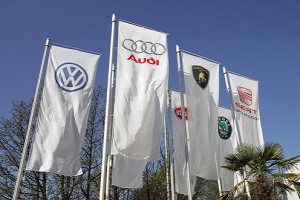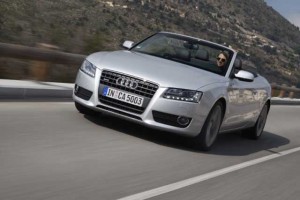
Volkswagen Group sales may have surpassed Toyota's during the first quarter of 2009.
Forget Toyota. The Japanese maker’s brief reign as the world’s best-selling automaker may already be over. For the first quarter of 2009, at least, the new king-of-the-hill is Volkswagen AG. But the silver lining is surrounded by at least a few gray clouds.
VW increased its market share to 11.0% from 9.7% for the first quarter. Despite the worldwide market for automobiles shrinking more than 20% in the first quarter of the year, 1.39 million vehicles were delivered, an 11.4% drop from the same period in 2008 of 1.57 million.
Detlef Wittig, EVP group sales and marketing proclaimed, “Our young and efficient model range, with some 180 different vehicles, is paying off. Our portfolio contains exactly the cars which are in demand by customers.”
The AG’s dominant brand, VW, saw its world market share grow 1.1 points to 7.4%, with first quarter sales of 876,000, a 4.8% decline. The Audi and Škoda brands each reported a 0.1% increase in market share, while SEAT’s share remained stable.
VW’s North American operations upped its market share a solid 1.0 point to 3.7%. In the U.S., the Group delivered 58,300 vehicles. That was down 19.3%, but considering the overall market, VW put in a better performance than the average of the competition, with the overall American market declining 38.4% during the quarter.
Optimistically, Wittig said, “During this year we will be debuting around 60 new models, product enhancements and successors with highly-efficient, low-consumption engines. With this model roll-out, we are very confident that we can, as planned, perform significantly better than the competition in 2009.”
Nice spin, right? Looking at preliminary numbers Toyota is/could/maybe going to lose it’s #1 position … for the first quarter, anyway. But, remember, it takes four quarters to make a fiscal year. And not all is well in Wolfsburg.

Will VW's Spanish brand take a back seat to the rest of the Group?
There’s some real pain, in Spain, with Seat, one of Volkswagen AG’s two bargain brands. While couched in splendid annual report-speak, even in a somewhat garbled translation from German or Spanish, the SEAT division lost a muy largo €141 million in 2008 versus a profit of €44 million in 2007. Sales in 2008 were 368,000 vehicles compared to 431,000 the previous year. The Spanish home market has been among the hardest-hit corners of Europe during the current, global recession.
Numbers like that are easy to understand. And while Erich Schmitt, president of SEAT, noted in remarks to the media when the report was issued, “In 2008 we made significant progress with regard to our products,” a senior VW corporate insider tells TheDetroitBureau.com there are more problems to be resolved. Indeed, said the source, “We’re not sure what to do with SEAT.” The problem is not just the sales decline or the slump in Spain, but a lack of any clear identity for the SEAT brand.
What worries some, both inside and outside VW, is that the automaker may be heading for the same sort of issues that have crippled its U.S. arch-rival, General Motors. With so many brands to feed, Volkswagen AG may simply not be able to differentiate a SEAT from a Skoda from a VW from an Audi without cannibalizing its own sales and pushing product development costs beyond a sustainable level in the long-term. That raises the question of whether it might eventually have to drop a brand or two, and if so, which one(s)? SEAT would seem most the most likely target, at least for now.
 There are certainly plenty of other distractions for Volkswagen AG management, including the on-going push for control by Porsche. Financial reports from Europe indicate the luxury sports car maker may “delay plans to expand its stake in Volkswagen as sales slide and debt mounts” following it acquisition of a majority holding in the bigger company.
There are certainly plenty of other distractions for Volkswagen AG management, including the on-going push for control by Porsche. Financial reports from Europe indicate the luxury sports car maker may “delay plans to expand its stake in Volkswagen as sales slide and debt mounts” following it acquisition of a majority holding in the bigger company.
Bloomberg News reported, “The maker of the famous sports car said it still aims to buy more Volkswagen shares but that any investment will depend on economic conditions. A majority stake in VW boosted Porsche’s first-half net income more than fourfold to €5.55 billion, and the company had pledged to lift the holding to 75% this year in order to add the larger company’s cash flow on to its books.”

New entries, like the A5 Cabriolet, helped propel Audi to its best year ever, in 2008, but recent signs hint at a slowdown.
In recent years, VW’s ascendant star has been Audi AG. Long the also-ran in the luxury market, a range of new products had finally helped Audi close in on rivals BMW and Mercedes-Benz, with 2008 the best year ever for Audi, with deliveries of 1,003,469 vehicles worldwide generating revenues of €34.196 billion, and pre-tax profits of €3.177 billion
But in March of this year, sales dropped 11%. But as they say in Germany, “nicht, sich Sorgen zu machen” or not to worry … not yet, anyway. But Audi’s big rivals aren’t about to cede their positions without a fight and are aiming some big guns, including the latest remakes of the BMW 7-Series and Mercedes E-Class.
Whether Volkswagen can hold its lead during the four quarters to come remains anything but certain.
